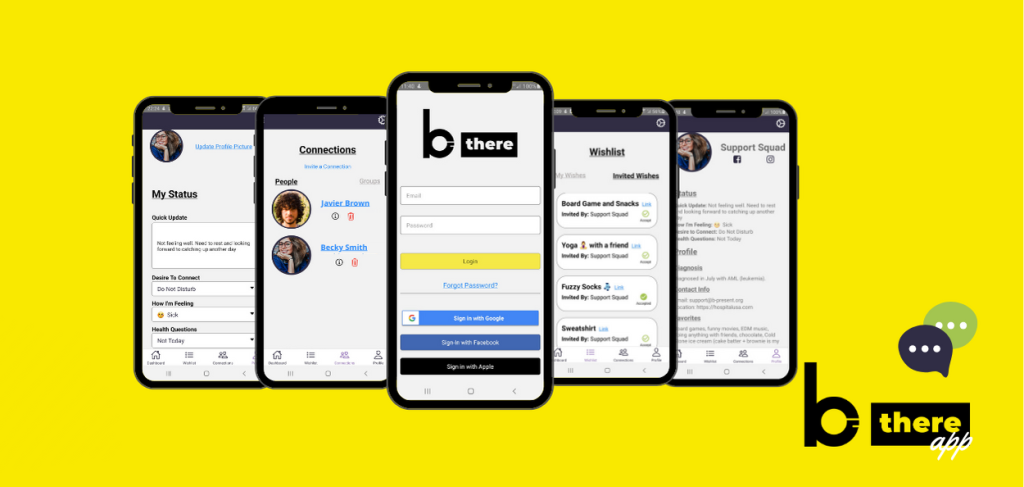
How to Support a Coworker with Cancer
When a coworker is diagnosed with cancer, it can be hard to know what to do or say. You might worry about saying the wrong thing, overstepping boundaries, or not being helpful enough. But here’s the good news: b-present has the tools to help you show up with confidence. Our motto? Be present, not perfect. Because thoughtful, genuine support if, when, and how it is needed, can make a world of difference in your coworker’s day-to-day life, both in and out of the office.
Acknowledge Their Diagnosis
It might feel easier to avoid the topic altogether, but a simple acknowledgment can go a long way. You don’t need to deliver a perfect speech, just be sincere. Try something like:
“Hey, I just wanted to say I’m thinking of you. I’m here if you ever want to talk.”
This opens the door for conversation without putting pressure or expectations on them to respond a certain way but just leaving a door left open to them.
Respect Their Privacy
Everyone handles a cancer diagnosis differently. Some people want to talk about it openly, while others prefer to keep it private. Follow their lead. If they share details, listen without prying for more information. If they’re quiet about it, respect their boundaries.
Offering Support at Work: What to Say and How to Help
Knowing how to offer help to a colleague with cancer can feel tricky because their needs may change from day to day. Support will depend on where they are in their cancer experience. There will be days where they don’t need help and don’t want to be treated differently, and other days where your kindness is welcome. Follow their lead.
Start simple: “How’s your day going?”
This opens the door without assuming how they’re feeling. Their response will guide you:
- “Today’s a good day.” Great! Maybe they’re up for coffee, lunch, or tackling a project together.
- “I’m having a tough day.” Acknowledge it with something like, “Is there anything I can do to lighten the load?” This could mean covering a deadline, taking notes during a meeting they can’t attend, or just being a supportive presence.
Be specific with your offers. While kind, vague statements like, “Let me know if you need anything,” can be hard to respond to. Instead, try:
- “Would it help if I covered your shift next week?”
- “I can take notes during meetings if you’re out for appointments.”
- “Want me to bring you lunch on Thursday?”
Specific offers show you’re genuinely thinking about what might help.
You know your professional relationship best, so keep your support aligned with that dynamic. And if they decline your offer? Don’t take it personally. Just checking in means more than you think.
Be Flexible and Understanding
Cancer treatment often comes with side effects like fatigue, nausea, and brain fog, which can affect work performance. Be patient if they need flexibility with deadlines, meeting times, or workload. If you’re in a position to adjust tasks or provide support, offer to do so without making them feel like a burden.
Keep Them Included
It can be isolating when coworkers stop inviting you to lunch, meetings, or social events because they assume you’re not up for it. Don’t make that decision for them. Continue to invite them, even if they decline. Just knowing they’re still part of the team can make a big difference.
Listen More Than You Speak
Sometimes, the best support is simply listening. If they bring up their cancer, it is because they feel you offer a safe space for them. Just remember, you don’t need to fix anything or offer advice unless asked. Let them share as much or as little as they want, and respond with empathy:
- “That sounds really tough. I’m so sorry you’re going through this.”
- “I’m here to listen if you ever want to talk.”
Download the free Supporter Roadmap to help guide you on the road to supporting someone with cancer.
Avoid Clichés and Toxic Positivity
Phrases like “Stay positive!” or “Everything happens for a reason” might be well-intentioned, but they can feel dismissive. Cancer is hard, and it’s okay for your coworker to feel sad, angry, or scared. Acknowledge their feelings without trying to put a positive spin on everything.
View this post on Instagram
Support Them Long-Term
Support often floods in right after a diagnosis but fades over time. Cancer treatment can last for months or even years, and the emotional and physical toll doesn’t disappear overnight. Check-in regularly, even after the initial wave of support has passed.
Final Thoughts
You don’t have to be perfect to be supportive. Small, consistent gestures like a thoughtful message, a flexible deadline, or an offer to grab coffee can mean the world to someone navigating cancer. Your presence, kindness, and willingness to listen matter more than you know.
Check out this episode of The Support Report with b-present for a listen on how to be a better supporter by taking care of yourself before you can take genuine care of a loved one.
Want more?
- Read Thoughtful Gifts for Someone with Cancer: The Ultimate Gift Guide
- Watch It’s A Two-Way Street: Why Good Communication Matters
- Read You Just Found Out Your Friend Has Cancer – Now What?
- Download the Supporter Roadmap
- Follow us on Instagram
- Learn more about the b-present Foundation

